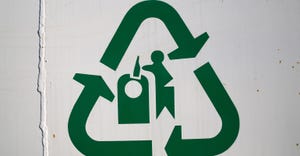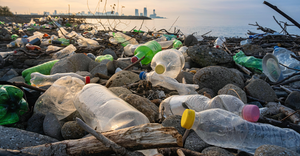The Glass Packaging Institute says the material is getting a bad rap in the recycling business, and the group is providing funds to help clean the material at MRFs to allow for better price recovery and encourage residents to continue re-use efforts.
The Arlington, Va.-based trade institute, which represents the glass container industry, on Tuesday announced it has provided $40,000 to two MRFs in North Carolina to improve their systems to better handle glass. The money, as well as $80,000 in grants from the state’s Department of Environmental Quality, will go toward installing cleaning and sorting systems at American Recycling of Western North Carolina LLC in Candler and Sonoco Recycling LLC in Raleigh.
American Recycling will install a more efficient glass breaker and cleaner line, and supplement its efforts with improved storage facilities for the recycled glass from two nearby brewery partners, New Belgium Brewing and Sierra Nevada.
Ron Moore, president and owner of American, said in a statement that the funding will help ensure his firm can secure the best equipment available to clean the three-mix glass stream it currently processes. Sonoco Recycling will move their existing glass breaker screen to an earlier part of the sorting process. Mike Pope, general manager and president of the firm, said the assistance from GPI and the state DEQ will help alleviate the costs associated with recovering glass from the single stream programs.
Lynn Bragg, president of GPI, says her group is doing its best to encourage MRFs to do all they can to clean glass as best as possible. Placing the glass-cleaning stations at the beginning of the MRF process is a step in the right direction, and can result in a better end-product, as glass can damage processing equipment. “It’s much better to have that removal equipment in the front end,” she says. “If you can get the glass out first, it helps reduce the contamination, with the result being cleaner glass.”
Industry standards here and abroad are demanding cleaner glass from the MRFs, resulting in lower prices for the “dirty” glass produced after it has been all the way through a sorting facility. Waste and recycling companies have already been renegotiating contracts with communities because of the low commodity prices, and the added expense to better clean the glass has been part of these agreements.
Earlier this month, Houston’s Mayor Sylvester Turner announced the city had reached an agreement after extended negotiations to renew its recycling contract with Waste Management—but the deal includes a removal of curbside glass collection. Residents can still take their glass bottles to a few pickup sites around the city, but the removal of glass from the single-stream system will save the city money, Turner said in a statement.
In part that stems from the fact that secondary� prices for recycled glass are low while processing costs are high, meaning companies lose money trying to recycle and resell the material.
But removing glass from recycling systems could have the adverse effect of lowering cities' recycling rates, which has led to pros wrestling with whether it's possible to save glass recycling.
Bragg says Houston’s solution goes against residents’ desires to recycle glass products. Her group predicts removing glass will reduce the city’s recycling rate by more than 20 percent, and will confuse residents who want to keep their glass out of landfills. “The city’s waste stream will now get a lot lighter, resulting in less dollars back, because glass is one of the heavier materials,” she says.
“These efforts we’re making in states such as North Carolina show that we can work to clean glass to help communities reach their price-point goals,” Bragg adds. “Most of all, residents want to continue to recycle glass, they understand it’s 100 percent reusable. It’s an environmentally friendly product that belongs in the recycle bin, not a landfill.”
About the Author(s)
You May Also Like


